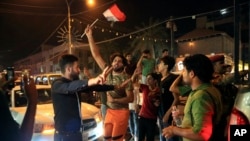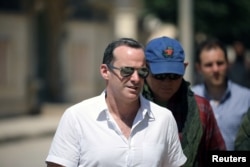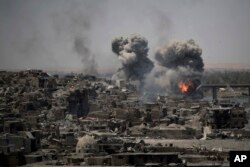The United States and its global partners fighting against the Islamic State group have made significant progress in recent days, especially since the liberation of Mosul, senior officials said Thursday, but they also are planning for stabilization and rebuilding efforts once the extremist group is fully defeated in Iraq and Syria.
Brett McGurk, the U.S. special envoy to the coalition against Islamic State militants, Thursday said fighting will continue for some time around the Syrian city of Raqqa and other areas where IS forces are still active. However, he added, the jihadist group is on an “irreversible and lasting path to defeat.”
At the same time, the United States and its partners in the 72-nation anti-IS coalition are moving forward with “stabilization planning,” he added.
Gulf diplomatic crisis has no effect
McGurk and other senior officials involved in three days of coalition meetings said the fight in Iraq and Syria is not affected by the diplomatic crisis that has divided nations in the Arab world since early June, when Saudi Arabia and other states broke off diplomatic and commercial ties with Qatar.
The Saudis, the United Arab Emirates, Bahrain and Egypt contend Qatar has been funding extremism. They want authorities in the emirate to downgrade its relations with Iran, Saudi Arabia’s main foe in the Middle East; Qatar has refused its neighbors’ demands and denies that it supports terrorism in any way.
Watch: Anti-Islamic State Coalition Intensifies Pressure on Extremists, Looks to Future
All of these Arab states, including Qatar, are members of the global coalition against the Islamic State group, which also known as Daesh in Arabic.
“When it comes to professional military relationships,” McGurk said, the split between Saudi Arabia and Qatar said should have “no impact on the counter-ISIS campaign, and that’s quite important.”
The United States has been pursuing diplomatic efforts to resolve the dispute among the Gulf states. Secretary of State Rex Tillerson has shuttled between Kuwait, Qatar and Saudi Arabia this week, and he told reporters Thursday: “In my view, there is a changed sense of willingness to at least be open to talking to one another, and that was not the case before I came.”
Critical stabilization sites identified
McGurk discussed the stabilization effort in Iraq after the coalition talks ended Thursday.
“We have identified 100 critical stabilization sites in and around Mosul, which will be the immediate focus for de-mining and restoration,” he said.
Senior officials from about 30 key members of the coalition took part in the final day of meetings, following two days of talks that brought together the full 72-member coalition. Among them were the three newest members from Africa — Chad, Niger and Djibouti.
“To date as a coalition, the U.S. has provided nearly three-quarters of the military resources required to support our partners on the ground,” McGurk said, and officials said each coalition member has been asked to identify areas where it can contribute to the group effort.
Humanitarian aid for Iraq announced
The U.S. Agency for International Development announced an additional $119 million in humanitarian assistance to Iraq Thursday, bringing Washington’s total aid contribution to more than $1.4 billion since 2014.
The new funding commitment is intended to provide additional emergency food and nutrition assistance, safe drinking water, hygiene kits, improved sanitation, emergency shelter and protection for Iraqis who have been displaced. The U.S. also provides medical assistance, including ambulances, medicine, and continued support for three field hospitals treating trauma patients.
New tactics needed
Jasmine El-Gamal, a senior fellow at the Atlantic Council, said that as Islamic State militants lose more and more territory, after their defeat in Mosul and shrinking control over Raqqa, it will be more difficult to combat the extremists with airstrikes and other tactics that could affect civilians taking shelter nearby.
“We are going to have to move more and more toward non-traditional means, El-Gamal told VOA, “like combating them online, over social media, [and] putting a lot more resources toward law-enforcement capabilities,” to prevent lone-wolf attacks by the terrorists.
Looking beyond the defeat of Islamic State, some foreign-policy analysts say that continuing conflict in the Middle East may require increased American engagement.
US focus a concern
Elliott Abrams, a senior fellow for Middle Eastern studies at the Council on Foreign Relations, contends the United States must prevent a “new Iran-Hezbollah-Shi’ite-Russia coalition” from filling in the spaces left after the jihadi group is driven out.
“It must be resisted on the ground, through the use of force by a coalition that must be built and led by the United States,” Abrams has written in the journal Foreign Policy.
Charles Lister, a senior fellow at the Middle East Institute in Washington, said the current U.S. strategy in Syria is focused on fighting Islamic State militants, rather than directly challenging the legitimacy of the Bashar al-Assad regime, which he blames for the instability that leads to extremism.
“It seems the U.S. remains ... focused on treating symptoms rather than root causes,” Lister said.








